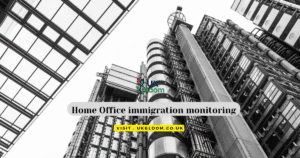New Salary and Qualification Thresholds to Reshape the Skilled Worker Route
Starting 22 July 2025, the UK Government will implement sSkilled Worker Visa Rules Set for Major Changes as part of broader immigration reforms outlined in its May 2025 Immigration White Paper. These changes, detailed in Statement of Changes HC 997, are designed to reduce net migration, curb abuse, and prioritise the recruitment and training of the UK’s domestic workforce.
UKBloom breaks down the key changes and what they mean for migrants, employers, and the UK’s immigration landscape moving forward.
Table of Contents
RQF Level 6 Qualification Now Mandatory for Skilled Worker Applicants

One of the most significant changes coming into effect is the increase in the required skill level for Skilled Worker visa applicants. From 22 July 2025, all new applicants must have a qualification equivalent to at least RQF Level 6, which is comparable to a UK bachelor’s degree.
Previously, the minimum skill threshold was set at RQF Level 3 (A-level equivalent), allowing a broader range of skilled roles to qualify for sponsorship. The new requirement will eliminate an estimated 180 occupations from the eligibility list, including several technician, administrative, and supervisory positions.
Who is exempt?
Transitional arrangements mean that individuals already on the Skilled Worker visa—or those who have applied by 22 July 2025—can continue to extend their visas, switch employers, and take supplementary employment in occupations below RQF Level 6.
However, the Government has clearly stated that these arrangements will not last indefinitely and will be reviewed in due course.
Increased Salary Thresholds for Skilled Worker Visas
Alongside the skill-level requirement, the UK Home Office is also implementing an uplift in the salary thresholds in line with the latest Annual Survey of Hours and Earnings (ASHE) data from the Office for National Statistics.
New salary thresholds from 22 July 2025:
| Category | Old Threshold | New Threshold |
|---|---|---|
| General Skilled Worker minimum | £38,700 | £41,700 |
| PhD-qualified applicants (relevant field) | £34,830 | £37,500 |
| New entrant route | Adjusted per role | Adjusted upwards |
These thresholds apply universally to new applicants and are not subject to transitional provisions. The increases reflect the Government’s aim to better align immigration with labour market needs and wage levels in the UK economy.
Employers sponsoring skilled workers must ensure the salary offered meets or exceeds both the general threshold and the occupation-specific going rate, which have also been adjusted.
For the most updated list of eligible occupations and salary thresholds, visit the Skilled Worker eligibility guidance on GOV.UK.
Transitional Measures for Existing Skilled Workers
While new applicants face stricter requirements, the Home Office has laid out limited protections for those already in the Skilled Worker route. These transitional arrangements allow current visa holders and applicants with a pending sponsorship to:
- Renew their visas
- Switch jobs (with new sponsorship)
- Take supplementary employment
- Bring dependants under the existing terms
These individuals can continue working in roles below RQF Level 6 and are not subject to the new skill-level restrictions for the time being.
However, the Home Office warns that these provisions are time-limited and will be re-evaluated as the reforms progress.
For more on extending Skilled Worker visas, check UKBloom’s detailed Skilled Worker Visa Extension Guide.
Why These Changes Are Being Introduced
In her ministerial statement, Home Secretary Yvette Cooper explained that these changes mark the beginning of a “complete reset” of the UK’s immigration system. The Government aims to reduce the UK’s dependency on migrant labour, especially in lower-wage sectors, by:
- Raising skill and salary thresholds
- Ending dependence on short-term migration fixes
- Encouraging domestic workforce training and retention
The Migration Advisory Committee (MAC) is expected to play a key role in reviewing the implementation of these changes and advising on future modifications to the Skilled Worker route and other employment-based visas.
Impact on Employers
Employers who rely on international recruitment must immediately assess their sponsored roles to determine if they still qualify under the new RQF Level 6 standard. Roles that no longer meet the skill level or salary threshold must either be restructured or phased out from overseas recruitment plans.
Key employer considerations:
- Update job role requirements and pay structures
- Ensure new CoS (Certificate of Sponsorship) issued after 22 July comply with new rules
- Communicate changes to current sponsored staff
- Consult legal or immigration advisers for switching routes or extensions
You can read UKBloom’s Employer Sponsorship Guide for step-by-step support.
Migration Advisory Committee Review
The MAC will be conducting a comprehensive review of the salary thresholds, occupation-specific going rates, and whether current discounts for new entrants and PhD-holders remain appropriate under the reformed system.
While this review is underway, no additional discounts or concessions are planned, meaning that employers and applicants must comply with the new minimums without exception.
The MAC’s findings, expected by late 2025, may lead to further changes to immigration routes and thresholds in 2026 and beyond.
Implications for Key Sectors
Health and Social Care
While care roles are now excluded from overseas recruitment entirely (see UKBloom’s care worker recruitment ban), the health sector will still rely on Skilled Workers for roles such as nurses, medical radiographers, and paramedics—provided they meet the new salary and qualification thresholds.
Education
Teaching roles in maths, physics, and computing remain eligible under the new rules, but school employers must ensure offered salaries meet or exceed the updated going rates.
Tech and Engineering
Most IT and engineering jobs continue to qualify, especially those requiring degrees or higher-level technical credentials. However, employers should re-check role classifications and salary updates.
Additional Points to Note
- Supplementary employment rules remain the same for existing visa holders.
- The Immigration Salary List (ISL), formerly the Shortage Occupation List, has been replaced and includes far fewer roles. There are no longer salary discounts or dependent rights associated with these roles.
- Those seeking indefinite leave to remain (ILR) must ensure continuous lawful status under the new conditions.
For full details on ILR, visit UKBloom’s ILR Guide.
What Applicants Should Do Now
If you’re planning to apply for a Skilled Worker visa:
- Submit your application before 22 July 2025 to qualify under current thresholds.
- Ensure your job offer meets RQF Level 6 and salary requirements if applying after the changes take effect.
- Check your sponsor’s licence and eligibility under the new rules.
- Consider alternative routes, such as the Global Talent visa or Graduate visa if your role no longer qualifies.
Explore UKBloom’s UK Visa Pathway Finder to identify the right route.
Home Office Warning to Employers
In a clear signal to businesses, the Government stated that all sectors must develop long-term plans for domestic workforce development. Sectors that fail to do so may face further restrictions, including reduced access to temporary or skilled visa routes.
The Government intends to monitor compliance closely and impose sanctions or remove visa access from non-compliant sectors.
Conclusion
The Skilled Worker visa changes taking effect from 22 July 2025 represent a major shift in the UK’s approach to work-based immigration. With higher salary and qualification thresholds, these rules aim to reduce reliance on lower-wage migrant labour and incentivise investment in the domestic workforce.
Migrants and employers alike should act swiftly to understand the new rules, assess their eligibility, and plan accordingly.
Related Links from UKBloom
- UK Skilled Worker Visa Requirements 2025
- Employer Sponsorship Licence Guide
- UK Immigration Reforms 2025 Overview
- Switching to a New Visa Route in the UK
External Links
Disclaimer
This article is for informational purposes only and does not constitute legal or immigration advice. While UKBloom strives to provide accurate and up-to-date information, immigration policies and rules are subject to frequent change. Always consult the official UK Government guidance or a qualified immigration advisor before taking any action based on this information.






